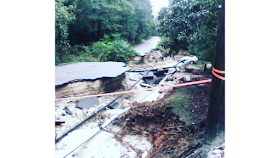South Carolina Flooding: Residents Warned Flooding Could Worsen Downstream; State's Death Toll Rises to 15
By Sean Breslin
Published Oct 7 2015 12:31 PM EDT
weather.com
Meteorologists Ari Sarsalari and Domenica Davis talk about Beaver Dam in South Carolina and the forced evacuations of residents.
Residents in South Carolina's Lowcountry were being warned that water from days of flooding across the state was moving in their direction, and it was going to have major impacts.
Near the coast, residents were seen sandbagging around homes, businesses and tourist attractions as they prepared for the surge of water that was headed their way. Though some areas have already dealt with flooding from the initial event, authorities said some areas that didn't see flooding may get swamped before all that water moves out to sea.
"We are going to be extremely careful. We are watching this minute by minute," said Gov. Nikki Haley.
South Carolina Rain Totals
Although the bulk of the rain has ended, high waters are still a very dangerous reality after the historic flood event in South Carolina. Rescue crews went door to door in South Carolina's capital city of Columbia as officials continued to free residents that were trapped by severe flooding that swamped virtually the entire state.
“I believe that things will get worse before they get better,” Columbia Mayor Steve Benjamin said Monday. “Eventually the floods will abate, but then we have to access the damage, and I anticipate that damage will probably be in the billions of dollars, and we’re going to have to work to rebuild. Some peoples’ lives as they know them will never be the same.”
Wednesday morning, Williamsburg County officials were asking some residents south of the Black and Santee rivers to evacuate as the two waterways overflowed their banks. Officials expected to see river flooding in the area, and they're hopeful that some controlled dam releases will alleviate the flooding, Live 5 News reported.
Dam failures were a constant concern for thousands of residents, days after the rain ended. Residents near one Columbia, South Carolina, dam were told to flee Wednesday morning, as it was believed to be near its breaking point, potentially putting thousands in the path of millions of gallons of water.
Those new evacuation orders were issued after concern that the Beaver Dam at Pebble Creek could breach. All residents were ordered to evacuate the area, asking that they go to A.C. Flora High School.
"Move to higher ground now. Act quickly to protect your life," wrote the National Weather Service's Columbia office in an alert sent to the area Wednesday morning.
According to the Richland County Sheriff's Department, the dam was stabilized at about 8:30 a.m. local time Wednesday morning. Authorities kept a voluntary evacuation notice in effect for residents living downstream of the dam.
During a Wednesday afternoon press conference, Gov. Haley said the state is monitoring 62 of South Carolina's thousands of dams. Thirteen dams have failed, she also said.
At least 15 people have died from the floods in South Carolina since the rain began to fall days ago. In the wake of the disastrous flooding event, President Barack Obama signed a disaster declaration for the state of South Carolina, ordering federal aid to supplement state, tribal and local recovery efforts.
Obama's action makes federal funding available to affected parties in Charleston, Dorchester, Georgetown, Horry, Lexington, Orangeburg, Richland and Williamsburg counties. Forms of assistance included are grants for temporary housing and home repairs, low-cost loans for uninsured property losses and other programs to help individuals and business owners recover.
The rain event has set records all over the state, flooding entire towns. For some locations, this historic rainfall qualifies as a 1,000-year rain event, meaning in a given year there is a 1 in 1,000 chance of observing rainfall totals of this magnitude.
"The flooding is unprecedented and historical," said Dr. Marshall Shepherd, a meteorologist and director of the atmospheric sciences program at the University of Georgia, in an email to The Associated Press.











































